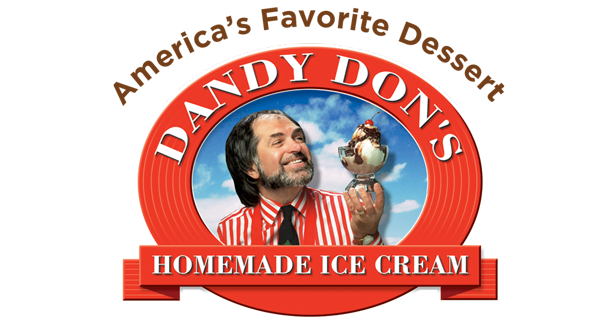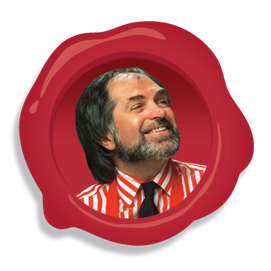What’s so Special about Dandy Don’s HomeMade Ice Cream?
Don Whittemore sat down with Angela Pettera, who writes the Restaurant News column for the Los Angeles Times, to answer a few questions about his business.
Angela: What’s so special about Dandy Don’s ice cream?
Don: We take so much care in making our ice cream for our clients. It’s not just a job — it’s our life.
Angela: How long have you been at this ice-cream purveying business?
Don: We started on May 1st, 1981. We’ve been serving restaurants since 1982, and when I get the chance I’ll show you our client list — they’re all very special.
Angela: All ice cream manufacturers whip their ice cream together with air. How much air do you mix into your ice cream?
Don: Overrun is the technical term used to define the amount of air in ice cream. For example, 100% overrun equals 50% air and 50% ice cream. Lower-cost ice creams are usually 100% overrun. Dandy Don’s overrun is between 50% and 60%. We use an Emery-Thompson batch freezer allowing us to naturally mix in the air.
Angela: How does your overrun percentage affect the taste of your ice cream?
Don: It’s not just about the taste; it makes a better texture. The ice cream is dense, but it is still light and creamy on the palate. What’s really critical, when you’re buying ice cream for a restaurant, is the weight of the ice cream. Most smart restaurant operators use portion control to manage food costs, so we serve the smarter operators best.
Angela: How so?
Don: Because they know the value of measuring by weight, not volume.
Angela: Can you give me an example?
Don: Most chefs scoop ice cream by weight, not by sight. A typical scoop is 4 ounces. A tub of Dandy Don’s ice cream may weigh 18 pounds or more, giving you a minimum of 72 four-ounce scoops. If you’re selling ice cream at $3.00 per scoop, your potential net profit is close to $200.00.
Angela: How often do you, personally, make ice cream?
Don: Not too often because our Production Manager makes ice cream better than I do, which makes me a great teacher, by the way. He makes ice cream every day. I think we’re the only ice cream company in Los Angeles to put a “made on” date on every tub and pint. Most other ice cream companies use an expiration date on their product. We’re so anxious to serve ours, we tell you when we made it. In ice cream, freshness counts.
Angela: What’s up with the Dandy Don’s branch in Guangzhou, China?
Don: It started with a hot fudge sundae at a Planned Parenthood fund-raiser in 1993. David Tong, who eventually became our partner in China, asked me if I could make ice cream in China. “Sure,” I said. Many years later we’re still pumping out Dandy Don’s American Ice Cream in Guangzhou, China, 120 miles from Hong Kong.
Angela: What is your personal favorite flavor of ice cream?
Don: Vanilla Bean. It didn’t used to be, but it goes so well with everything. And… all kinds of chocolates, like Bittersweet Chocolate, Milk Chocolate, Cappuccino Crunch, Triple Chocolate with Chocolate Chips and Fudge, and Mandarin Orange Chocolate.
He made music, but now he’s into ice cream
LA Herald Examiner
Examiner: How long were you in the record business?
Don: About 10 years. I promoted records and did public relations for various record labels. At the tail end of my record business career, I even managed a couple of artists.
Examiner: Why did you leave the record business?
Don: I got bored. I got tired of calling on people – radio programmers – who couldn’t say yes or no. The business was changing so much, it got so fierce, and I just missed getting that instant feedback, the thing that says you’ve done your job well, or no, you haven’t done it well, so you’d better go back and do your homework.
Examiner: Were you able to foresee problems in the record business?
Don: Oh, sure. Any time you start restricting radio play lists, confining it to 40 records, then 30 records, you start forgetting about creativity. Any time you do that you’ll have problems. I used to say I was drowning in a sea of mediocrity.
Examiner: How did you conceive of the idea of the Creamery?
Don: The Creamery was already here. I was a customer. I used to come in with my family. One night I began to notice that the Creamery was being poorly managed. I knew these people really wanted to sell. Instinct told me that.
Examiner: How much money did it take to start the Creamery?
Don: About $20,000 down. That’s just part of the investment. Then you have the remodeling and the refurbishing.
Examiner: I imagine that what started out as a decent enough idea became all consuming. After all, you’re a small businessman. What’s it like to survive on a block like Ventura, a block that’s lined with every conceivable kind of store?
Don: Well, I have to sell wholesale. There are not a lot of people who want to buy ice cream from me – even though it’s gourmet, natural and homemade. Today, a small businessman has a difficult time starting out. It takes time and big capitalization. What’s difficult is paying the rent every month, paying your bills every month.
Examiner: It must be especially tough selling ice cream in the winter.
Don: Yes. In the winter, business falls off 40 percent. It’s the same with us as it is for beer companies, patio furniture people, spa manufacturers, air conditioning. People like us are caught in a crunch. We can’t go to the bank to borrow money to get through the winter. And the last money I borrowed, which was nine months ago, cost me 23 percent.
When I go out to sell wholesale, most restaurateurs want price. They don’t care about quality.
Examiner: Did you quickly realize that you could not make it just selling ice cream?
Don: Yes. I noticed that last winter. The business just fell off. I came in here in May and it was great, but nobody told me about the fluctuation.
Examiner: What did you do?
Don: I put in hot dogs. Then simple things, like apple juice, cookies, chips, chili. Then chili-dogs and cheese-dogs and all the things I took for granted. When you know nothing about a business and suddenly you’re in it, you say, “Holy smoke! I’d better get cookin.’” That’s what I did.
Examiner: Now you’ve put in video games.
Don: Yes, and I’m on my fourth vendor already. The thing about games is that you have to market them. You have to look at the demographics of the people who come in your store. You’ve got to have the right games. You can’t have games that are too clever for the 12 year olds, because they won’t play them.
Examiner: Won’t games turn your place into a hangout?
Don: It’s a double-edged sword. You can make good money, if you have the right games.
Examiner: With kids coming in here all the time to play video games, do you find yourself having to become a traffic cop?
Don: I’ll be real candid with you. It took me a while to figure out that it wasn’t necessary for me to be their friend. I started to observe what was going on. For awhile, it was nothing out of line. Then they went to the bathroom, and I smelled hash. Here was this kid, the son of a neurosurgeon, standing in the entrance to the restroom stoned, blitzed. He had been smoking hash. So I said, “You’ve been smoking hash in my place. Get out of here!” That’s when the light went on in my brain. It becomes serious business if you let these kids get away with smoking dope in your store. Pretty soon, you’re out of business.
So I started getting serious about it. I found a bong, a smoking pipe, that was stashed behind one of the water fountains. I took that sucker and threw it out. A week later, I saw two of my regular customers – ninth-graders – rolling a joint! I went over, picked up the marijuana and said, “OK, boys, enough of this crap.” They asked if they could have it back. “No,” I said, ” If you want it back, send your parents down to get it back.” And that’s the last I heard about that dope.
Examiner: OK, but you come from the music business, the land of liberal attitudes. Now, you’re a disciplinarian. How do you feel about that?
Don: It’s like Lennie Bruce once said, “There’s nothing as sad as a hipster getting old.”

